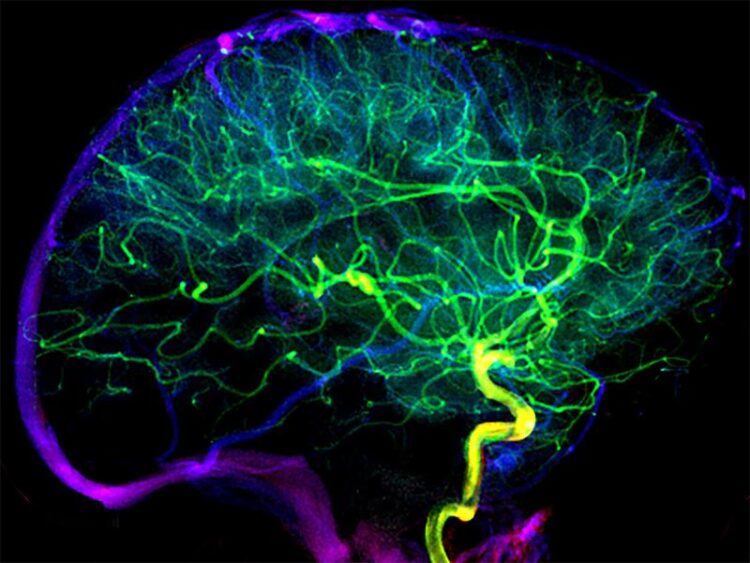Arterial Connections Improve Treatment Outcomes Following Stroke

Visualization of the blood vessels in the brain of a patient without early venous filling.
(c) P. Thurner und Z. Kulcsar / University Hospital Zurich
Blood vessels that cross-connect adjacent arterial trees regulate blood flow to the brain in stroke patients. Researchers at the University of Zurich have now shown that these vessels prevent brain hemorrhage following treatment to remove blood clots. They play a crucial role in the recovery of stroke patients.
Ischemic strokes are a major health burden. They occur when a blood vessel that supplies the brain becomes blocked, impairing blood flow to the brain. As a result, brain tissue suffers from a lack of oxygen and nutrients, which causes symptoms such as paralysis, confusion, dizziness, headache, trouble speaking or even death.
Many stroke patients recover poorly despite timely treatment
To treat these symptoms and restore blood flow to the brain, the obstructed vessel needs to be “declogged”, or recanalized. Contemporary treatments to remove the clot include intravenous thrombolysis or mechanical thrombectomy using a catheter. However, even with timely clot removal, many stroke patients only recover poorly.
The research group of Susanne Wegener, professor at the University of Zurich (UZH) and senior leading physician at the Department of Neurology of the University Hospital Zurich (USZ), has now demonstrated that the outcome of stroke treatments depends on the collateral network. Collaterals are blood vessels that cross-connect adjacent arterial trees, providing potential detour networks in case of a vascular blockage. “These vascular bridges maintain cerebral autoregulation and allow for a slower, gradual reperfusion, which results in smaller infarcts,” says Wegener.
Rapid reperfusion increases mortality
For their study, the research team with the two co-first authors Nadine Binder and Mohamad El Amki used a mouse model of stroke as well as advanced in vivo imaging methods to investigate changes in the arterial blood supply. In mice with poor collaterals, the arterial segments were dysfunctional and rigid after clot removal. “The rapid reperfusion that followed caused brain hemorrhage and increased mortality,” says Wegener.
The researchers were then able to confirm the results obtained in the mouse model in stroke patients. Stroke patients who had poor collaterals showed a similar rapid reperfusion following treatment to remove blood clots, also resulting in small cerebral hemorrhages and unfavorable recovery.
The better the arterial connections, the better the recovery
So far, the focus has been on quick removal of blood clots in stroke patients, while problems associated with rapid post-treatment reperfusion and its potential harmful effects had received little attention. The study now implies that it is possible to identify stroke patients with a higher risk of poor recovery by the speed of reperfusion during treatment. “Future therapeutic interventions for stroke should aim to enhance collateral function, allowing for beneficial reperfusion after stroke,” concludes Susanne Wegener.
Wissenschaftliche Ansprechpartner:
Prof. Dr. med. Susanne Wegener
Department of Neurology
University of Zurich and ETH Zurich
Phone: +41 44 255 55 11
E-mail: susanne.wegener@usz.ch
Originalpublikation:
Nadine Felizitas Binder, Mohamad El Amki, et. al. Leptomeningeal Collaterals Regulate Reperfusion in Ischemic Stroke and Rescue the Brain from Futile Recanalization. Neuron. February 26, 2024. DOI: 10.1016/j.neuron.2024.01.031
Weitere Informationen:
Media Contact
All latest news from the category: Life Sciences and Chemistry
Articles and reports from the Life Sciences and chemistry area deal with applied and basic research into modern biology, chemistry and human medicine.
Valuable information can be found on a range of life sciences fields including bacteriology, biochemistry, bionics, bioinformatics, biophysics, biotechnology, genetics, geobotany, human biology, marine biology, microbiology, molecular biology, cellular biology, zoology, bioinorganic chemistry, microchemistry and environmental chemistry.
Newest articles
Faster, more energy-efficient way to manufacture an industrially important chemical
Zirconium combined with silicon nitride enhances the conversion of propane — present in natural gas — needed to create in-demand plastic, polypropylene. Polypropylene is a common type of plastic found…

Energy planning in Ghana as a role model for the world
Improving the resilience of energy systems in the Global South. What criteria should we use to better plan for resilient energy systems? How do socio-economic, technical and climate change related…

Artificial blood vessels could improve heart bypass outcomes
Artificial blood vessels could improve heart bypass outcomes. 3D-printed blood vessels, which closely mimic the properties of human veins, could transform the treatment of cardiovascular diseases. Strong, flexible, gel-like tubes…




















